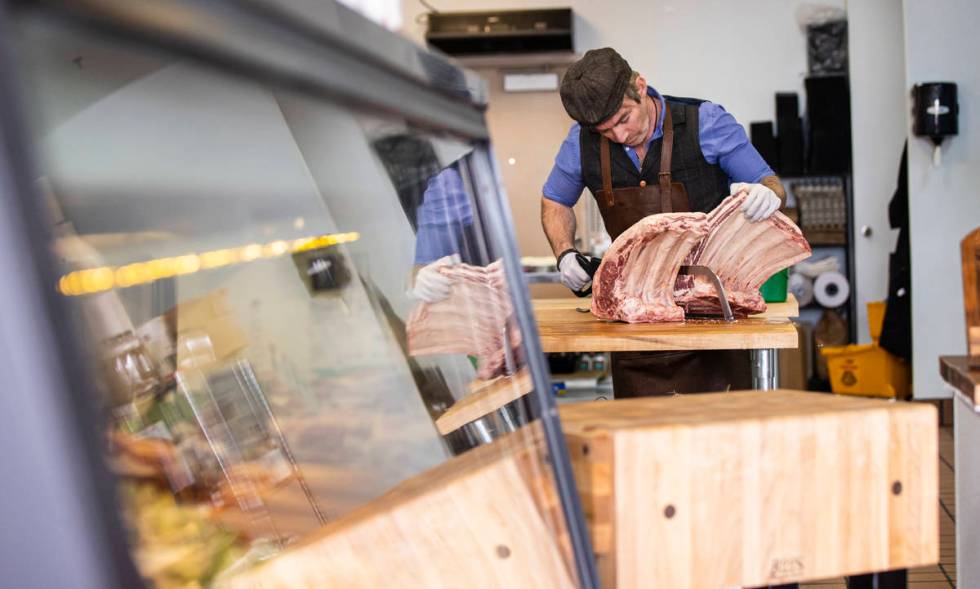Brit butcher marbles meat with tasty ethics

It’s doubtful there are many butchers who would advise you to eat less meat, but Martin Kirrane isn’t your average butcher.
Kirrane is the owner of Featherblade English Craft Butchery, which opened last month at 8550 W. Charleston Blvd., just east of Durango Drive. Yes, he really is English; Kirrane co-owned two butcher shops in London. He first came to Las Vegas in 2017 for Thanksgiving with the family of his wife, Melinda, and that’s when he discovered that his type of butchering was as rare here as a Union Jack in a Fourth of July parade.
“In England, all-animal butchering is normal,” Kirrane said. “In Las Vegas, it’s not.”
“All-animal,” also known as nose-to-tail, is a practice that’s especially catching on with butchers and chefs on the American coasts. It’s just what it sounds like — using every possible part of the animal. While supermarkets and most butcher shops get their meat in primal cuts (the chuck, say, or round), Kirrane gets the whole hog. Or cow, or lamb.
The whole carcasses arrive in his shop — a steer every two to three weeks, two or three pigs and three lambs a week — and he and apprentice James Henderson butcher them. The premium cuts may be dry-aged to improve flavor and texture. Other parts are turned into ground meat, sausages or meat pies or sold to someone who makes jerky. Even the fat is used, rendered for the pastries for the meat pies.
But the distinctions of Featherblade’s meats don’t end there. Melinda Kirrane, who their newsletter calls the “actual driving force of Featherblade Craft Butchery,” is a public health practitioner who worked for the National Health Service when she lived in England and is with a consultancy now. Her focus is developing policies to improve people’s health. Together the Kirranes are dedicated to selling the most healthful, ethically raised and sustainably sourced meats possible, and to be completely transparent about it all.
“We’re all about the ethics,” Martin Kirrane said. “We just don’t know what we’ve been eating for the past 30, 40 years.”
The pork he sells is raised locally, the lamb, poultry and beef in California. Kirrane estimates he does about 40 percent prime beef. The rest is from Santa Carota, a ranch near Bakersfield that raises the steers on grass but finishes them on carrots.
Yes, carrots. They’ve been doing it since 1989 and say it increases the flavor and nutritional qualities of the meat.
“I thought it was a genius idea,” Martin Kirrane said. “People come in just for that.” After a recent shipment, he said, the rib eye and strip steaks — the familiar cuts people desire for tossing on the grill — were gone in two days.
“And then I was stuck with a lot of round and chuck pieces,” some of which went into steak-and-ale pies. Some of it also ended up as hamburger; when you grill, “if you don’t have steaks, the next best thing is burgers.”
As you might imagine, the Santa Carota beef is priced at a premium, about equal to prime cuts. But because they feel the meat is more healthful than supermarket cuts, the couple are working to become eligible to accept electronic-benefits-transfer, or EBT, cards, for people who are in the federal Supplemental Nutrition Assistance Program.
Kirrane’s mantra of “Eat better meat less often” is a way to encourage people to use the same percentage of their budget to consume better-quality meat.
Already he’s earning a following, including people from the restaurant industry. One is Tervon Flowers, executive sous chef at Beauty &Essex at The Cosmopolitan of Las Vegas.
“We used some for samples for the restaurant — just wanted to try it out,” Flowers said. “The skin-on, double-barrel pork chops were out of this world, lamb steaks were phenomenal. The Santa Carota has a good dry-aged finish to it. I’m not a super-big fan of dry-aged, but the meat was tender.”
Kirrane said customers seem to feel good about the shop’s policies, especially regarding transparency, and Flowers is one.
“I think the biggest thing about the place is it was nice to talk to somebody who knows where their meat’s coming from,” Flowers said. “I really like the fact that they will break down the meat the way you want. It was a nice friendly atmosphere, and they care about their beef. I’ll be back next week.”
Erin Taylor, who was in the shop last week, probably won’t be back quite so soon. Taylor, who lives in Phoenix, was visiting her father in Las Vegas.
“I’ve got a list,” she said upon entering the shop, explaining that her wife is English. “I’ve been instructed to bring some stuff back,” such as “Featherblade proper bacon,” quite meatier than its American counterpart.
And in case you’re wondering about the name, that’s also a nod to tradition. Kirrane explained that “featherblade” is the English version of a flatiron cut, the fat appearing to form a feather shape in the center.
“It’s an old-school English cut,” he said. “That’s kind of what we’re all about.”
Contact Heidi Knapp Rinella at Hrinella@reviewjournal.com. Follow @HKRinella on Twitter.